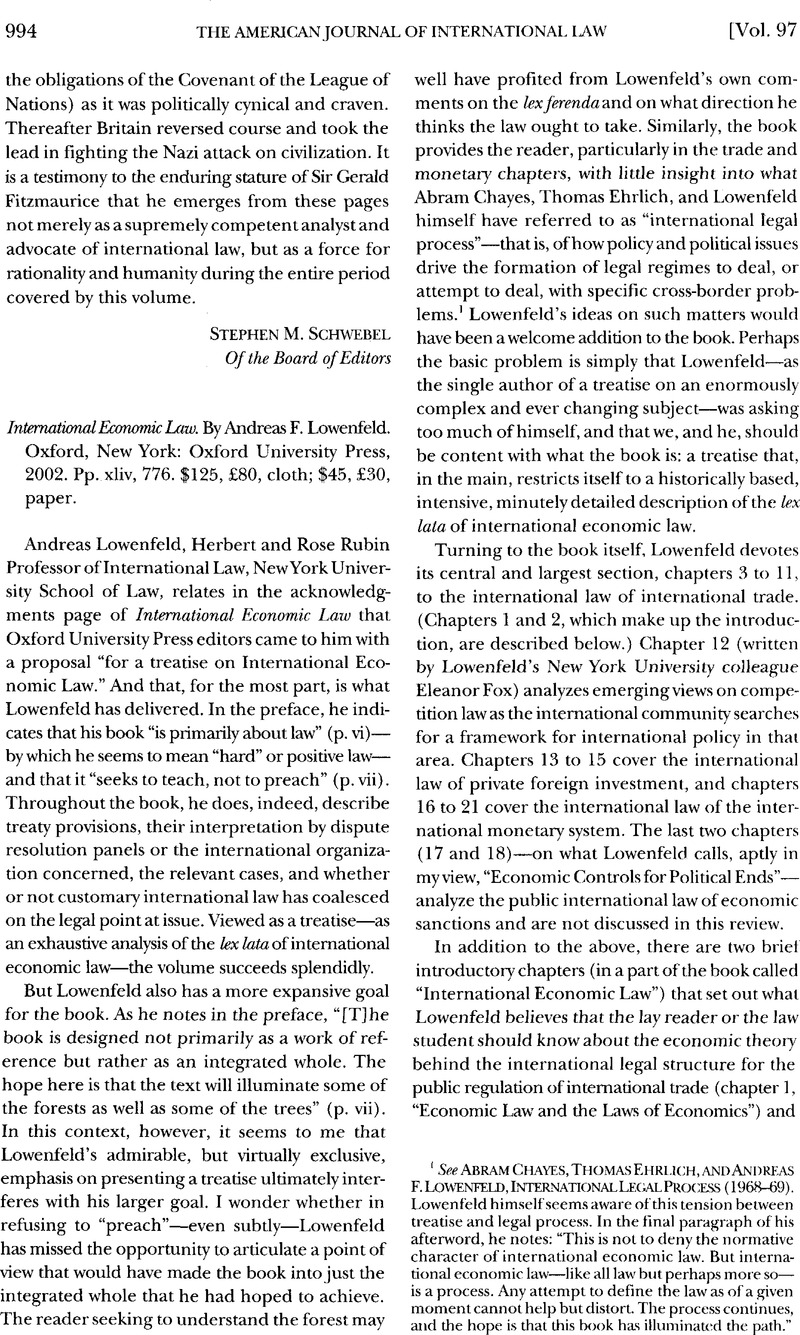No CrossRef data available.
Article contents
International Economic Law. By Andreas F. Lowenfeld. Oxford, New York: Oxford University Press, 2002. Pp. xliv, 776. $125, £80, cloth; $45, £30, paper.
Published online by Cambridge University Press: 27 February 2017
Abstract

- Type
- Recent Books on International Law
- Information
- Copyright
- Copyright © American Society of International Law 2003
References
1 See Abram Chayes, Thoimas Ehrlich, And Andreas F. Lowenfeld, International Legal Process (1968-69). Lowenfeld himself seems aware of this tension between treatise and legal process. In the final paragraph of his afterword, he notes: “This is not to deny the normative character of international economic law. But international economic law—like all law but perhaps more so— is a process. Any attempt to define the law as of a given moment cannot help but distort. The process continues, arid the hope is that this book has illuminated the path.“
2 The fourth, as mentioned, is what Lowenfeld calls “economic controls for political ends“—that is, sanctions. Each scholar of international economic law has his or her own list of topics included in the rubric. There is no general agreement on the scope of the subject, although international commercial law is usually included (despite Lowenfeld's omission of it in this treatise).
3 Leon Brittan, Address at the WTO High Level Symposium on Trade and the Environment (Mar. 15, 1999), at http://www.wto.org/english/tratop_e/envir_e/lbenv.htm.
4 Jackson, John H., The WTO Dispute Settlement Understanding— Misunderstandings on the Nature of Legal Obligations , 91 AJIL 60, 60 (1993).Google Scholar
5 Banco Nacional de Cuba v. Sabbatino, 376 U.S. 398 (1964).
6 In addition to what has already been mentioned, he worked early in his career in the Legal Adviser's Office of the U.S. Department of State, served as rapporteur for the Restatement (Third) of the Foreign Relations Law of the United States, and is on the Board of Editors of this Journal, among many other activities and accomplishments.
7 Barcelona Traction, Light & Power Co. (Belg. v. Spain), Second Phase, 1970 ICJ REP. 5 (Feb. 5).
8 See Rudolf Dolzer & Margrete Stevens, Bilateral Investment Treaties 8 (1995) (Citing Donald Richard Shea, The Calvo Ct Ause: A Problem Of Inter-American And International Law And Diplomacy) : “As early as 1896, the Argentine jurist Carlos Calvo asserted that rules governing foreign investment should be based on the concept of national treatment and that relevant rules of domestic law should not be modified by norms of international law.“
9 Dam, Kenneth W., The Rules Of The Global Game: A New Look At Us International Economic Policymaking 200 (2001).Google Scholar
10 For a fuller explanation of this phenomenon, see Cynthia C. Lichtenstein, Dealing with Sovereign Liquidity Crises: New International Initiatives for the New World of Volatile Capital Flows to and from Emerging Markets, 29 Mcgeorgel. REV. 807 (1998).
11 For the legal aspects of this debate, see Cynthia C. Lichtenstein, International Jurisdiction over International Capital Floxos and the Role of the IMF: Plus Ca Change…, in International Monetary Law: Issues For The New Millennium 61 (Mario Giovanoli ed., 2000).




